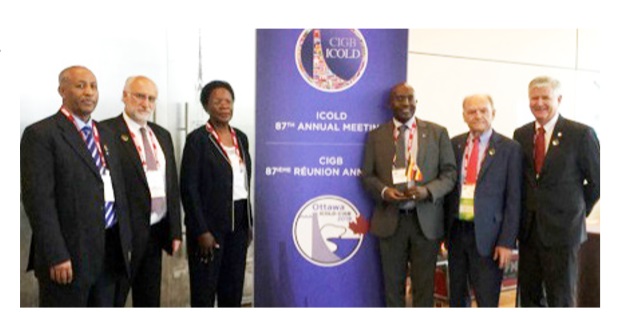
There is good news for Uganda which is investing heavily in the energy sector development projects to support economic activities.
| THE INDEPENDENT | On June 14, Uganda was formally elected as the 101 member of the International Commission on Large Dams (ICOLD).
This was announced at the ICOLD’s 87th Annual General Meeting and Symposium held in Ottawa, Canada.
ICOLD was founded in 1928 to provide a forum for discussion and for the exchange of knowledge and experience in dam engineering for engineers and players involved in the development of water resources.
The commission works to advance the art, science, and engineering techniques for the planning, design, construction, operation, and maintenance of safe dams to ensure sustainable development and management of the world’s water resources.
It accomplishes its objectives through its various national committees and regional clubs by exchanging information and experiences and through annual technical meetings and general assembly, triennial congresses, studies and research, and publications of proceedings, reports and technical bulletins via its 28 technical committees and over 500 experts.
The commission’s work is critical because power dams are a vital part of the infrastructure worldwide and provide many benefits but also present significant risks.
The benefits in this case include water supply, agriculture, recreation, hydroelectricity, flood control, navigation, and mining. On the other hand, the major risk is dam failure, which releases the energy of the water stored behind the dam and can cause loss of lives and extensive damage to property and the environment.
The risk of failure is higher in dams that are poorly planned, designed, constructed, and inadequately operated and maintained.
ICOLD does not only deal with technical aspects related to the design and safety of large dams but is also concerned with dams of all sizes and purposes – including small dams, mine tailings, dykes and levees.
It provides a forum for the exchange of knowledge and experience based on nearly a century of global practice.
Whereas ICOLD has made remarkable progress in developing standards and guidelines to ensure that dams are built and operated safely, the recent catastrophic dam failures – Brumadinho in the state of Minas Gerais, Brazil in January, 2019; Xe-PianXe-Namnoy Hydroelectric Dam in July, 2018 in Laos, and California’s Oroville Dam in February 2017 show that there is still a lot of work to be done and calls for renewed focus on continuous improvement in the development and operation of dams.
Uganda joined ICOLD under the National Committee name of Uganda Commission on Large Dams (UCOLD).
UCOLD membership to ICOLD was driven by the increasing number of dams for hydropower generation, water supply, and water for production, agriculture.
The founding agencies are the Directorate of Water Resources Management (DWRM) and Uganda Electricity Generation Company Limited (UEGCL).
The current President of UCOLD is Callist Tindimugaya – the commissioner in the DWRM and the Vice-President is Harrison E. Mutikanga – the chief executive officer of UEGCL.
The Secretary is Frederick Wasike – the senior dam safety engineer at UEGCL. The National Committee is going to grow to include other government ministries and agencies and private organisations involved in the management of water resources, development and safe operation of dams and with interest and competence in matters related to improving dam safety such as ministry of disaster preparedness, regulatory authorities, consultancy firms, construction firms, research institutions, universities, and professional institutions.
Mutikanga said that by joining ICOLD, Uganda will now access publications on advances in technology of dam engineering, standards and guidelines on dam safety, networking and sharing knowledge and experiences with international experts on dam safety best practices.
He added that the success of UCOLD will depend on the individual contribution of its members mainly on volunteer basis.
“We therefore encourage organisations with persons competent and interested in matters relating to dam safety and sustainable water resources to join UCOLD and ensure better dams for a better world,” he said in a notice shared on June 24.
This development comes a few months after the country increased its electricity generation to 1,177 MW in March 2019, following the commissioning of the Isimba Hydro Power Plant (HPP) that added 183 MW to the National Grid. The government plans to commission the long awaited, largest 600MW Karuma hydropower dam at the end of this year.
The government is continuously investing substantial sums of its budget on development projects in the energy sector mainly to power industries – the key for achieving the long term development agenda.
****
Additional reporting by Julius Businge
 The Independent Uganda: You get the Truth we Pay the Price
The Independent Uganda: You get the Truth we Pay the Price



